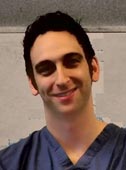Residents' Corner
SYNTHESIZING INTERNATIONAL DEVELOPMENT AND SURGERY

Joshua Greenberg
|
Long before his undergraduate
medical training at the
University of Toronto, first year
resident in General Surgery
Joshua Greenberg did a foundation
year in philosophy and
literature, during which he read
Plato’s Republic and Rousseau’s
Discourse on the Origins of
Inequality. These works sensitized
him to social injustice and structural violence as
later described by the American physician - anthropologist
Paul Farmer. Of his decision to specialize in surgery,
Joshua remarks, “This is an exciting time to be able to
get the wide breadth of training surgery offers and apply
it to the complex issues of equity, access, and infrastructure
development that threaten healthcare today.”
Joshua’s Bachelor’s degree in Biomedical Science is from
the University of British Columbia and his Master’s
work in molecular oncology and international development
was done at U of T. The research was published in
Cancer Research.
Joshua has done International Development work for
10 years with UNAIDS, UNDP and other NGO’s. He
has worked in Zambia, Uganda, Kenya and several other
sub-Saharan countries. He performed needs assessments,
researched and addressed issues of knowledge translation
with multinationals, and worked at a teaching hospital
with UNICEF along the Zambia-Zimbabwe border
during the height of Zimbabwean political upheaval.
The Zimbabwean refugees, displaced from their homes
and deprived of their antiretroviral agents as they fled
the country, made a lasting impression on him. “It fascinated
me to see the quality of healthcare some countries
were able to provide their people through intelligent
organization of their infrastructure while other countries,
often wealthier, where unable to accomplish the
same feat by monetary investment, alone.”
|
Joshua’s plan is to contribute on an international
scale, using surgery as the springboard. He chose to
specialize in surgery because of the versatility surgical
training provides, as well as the research highlighting
the cost effectiveness of basic surgical intervention in
resource poor-settings. He would like to learn more
about the structure and delivery of healthcare internationally
through elective studies abroad. There are
many Toronto links to the developing world which he
finds inspirational. The Toronto-Addis Ababa Academic
Collaboration (TAAAC) led by Clare Pain of Mount
Sinai Hospital is of particular importance (see also:
http://www.surgicalspotlight.ca/Article.aspx?
ver=Winter_2010&f=InternationalSurg). Clare Pain has shown us
how to train future physicians, even in a resource-poor
and clinically under-served setting. There are now 16
disciplines that have picked up on her pioneering work
in psychiatry. With the TAAAC, Joshua worked on the
pre-trip cultural sensitivity training program and the
ethical framework for large-scale cross-cultural collaboration.
He has also worked with “Peace through Health”
from McMaster, a program that promoted similar principles
as the International Physicians for the Prevention
of Nuclear War. This concept of reframing war as a
health care issue has been applied with great success to
vaccination campaigns credited with ceasefires in wartorn
countries like Sudan, Sierra Leone, and the DRC
“as the one time when warring factions came peacefully
to the table, recognizing their common humanity and
their need to protect their children from disease.” Joshua
has taken several courses in this area of study, and his
mentors include Clare Pain and Joanna Santa-Barbara
at McMaster.
Joshua was a high level competitor in volleyball and
beach volleyball. As a ‘weekend mountaineer’, he has
climbed Kilimanjaro and to the base camp of Mount
Everest. He is currently reading Abyssinian Chronicles by
Moses Isegawa, a book which spans five decades in the
political history of Uganda.
M.M.
|